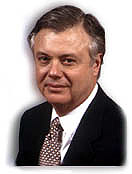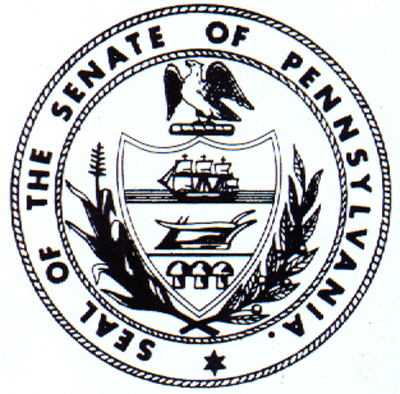|
|
||||||
FOOD DISTRIBUTION CENTER WILL MOVE TO NAVY YARD PHILADELPHIA, September 22, 2005 – A modern new food distribution center at the east end of the former Philadelphia Naval Shipyard will become the home of produce and seafood markets that had once considered moving their operations to New Jersey, state Sen. Vince Fumo (D-Philadelphia) announced today. The project will keep nearly 1,500 jobs in the city of Philadelphia, increase future job opportunities, and provide an efficient state-of-the-art facility for 41 companies that currently generate more than $1.5 billion in annual sales. The new facility will allow these Pennsylvania businesses and their workers to compete more effectively with major distribution hubs located in New York and Maryland for a larger share of the rapidly growing fresh food business. "I’m glad we were able to keep these jobs in the city of Philadelphia," said Fumo. "It is important not only for the men and women who work here, but also for the many restaurants and other food-related businesses all over Pennsylvania who rely on the center for convenient, cost-effective service." Fumo, who worked for five years to develop a financing plan and find a suitable location for the new distribution center, made the announcement today at the Navy Yard in South Philadelphia, along with Governor Ed Rendell, Mayor John Street, other elected officials, and representatives of the food vendors. Both the current and future food distribution centers are in Fumo’s senatorial district. "I would like to thank our own state Senator, Vincent Fumo, for his help, support and guidance in our effort to find a new home for the 1,500 people who work at our businesses here in Philadelphia," said Sonny DiCrecchio, executive director of the Philadelphia Regional Produce Terminal. "Being born and raised in South Philadelphia, Senator Fumo understands the close ties that our businesses have with the city. We are often second and third generation family-owned businesses. Many of our employees live within a few miles of our plants and warehouses. "That is why when we came to Senator Fumo with our needs, he immediately understood how important our situation was and began to help us develop a solution to our problems," DiCrecchio added. The state-of-the-art markets -- 800,000 square feet for produce and 160,000 for seafood -- will occupy 85 acres within the Navy Yard. The project, which will be funded as a joint venture between Philadelphia’s produce and seafood vendors and the Commonwealth of Pennsylvania, will cost as much as $100 million to construct. Half that amount will be provided by the Commonwealth and the remainder will come from bonds backed by payments from a long-term lease signed by the merchants with the Philadelphia Regional Port Authority (PRPA), which will assume control of the 85-acre site from the Philadelphia Industrial Development Corporation (PIDC). PIDC will take over the 30 acres where the current food distribution center is situated, at the intersections of Packer Avenue with Galloway and Lawrence. The project will also be supported by various Commonwealth investments to upgrade the utility and transportation infrastructure around the site. These investments will benefit existing port related businesses and existing users of the Navy Yard, and will make the remaining undeveloped land at the Navy Yard and around the port more attractive for future development. When the new produce and seafood markets are complete, refrigeration storage capacity will climb from the current 650,000 packages to 2.8 million packages. Merchants estimate that will require an increase of 25 percent more jobs. Officials hope to break ground on the project by the end of this year. The building process will likely take up to two years. The Food Distribution Center has been housed in an antiquated facility built in 1959. Due partly to more stringent federal regulations regarding food handling, the vendors faced the prospect of a large capital investment to upgrade their current location. Additionally, the size of their facility was not suitable to meet the needs of that upgrade, so they were forced to either expand or relocate. In the summer of 2000, Fumo began working with representatives of the produce and seafood markets after they approached him concerning their future needs. Fumo asked them to develop preliminary plans and cost estimates that he could use to formulate a state funding proposal. Bio-terrorism concerns after the attacks of September 11, 2001 resulted in additional federal rules and increased the urgency to modernize. After New Jersey offered to find a location for the food distribution center, efforts on the Pennsylvania side intensified. Beginning in the fall of 2003, Fumo held numerous meetings in his office to create a Pennsylvania plan. The meetings included PIDC, the PRPA, city government, City Council President Anna Verna, state Rep. Bill Keller (D-Philadelphia), the governor’s staff, and representatives from both markets. One critical step in reaching an agreement was Fumo securing a commitment in December 2003 from Gov. Rendell for state assistance. By the spring of 2004, the markets had decided to reject the New Jersey offer, but continued to negotiate with Pennsylvania for a new location, negotiations in which Fumo and his staff were deeply involved. "Governor Rendell and Senator Fumo are to be congratulated for their efforts to keep the Food Distribution Center in Philadelphia," said U.S. Congressman Bob Brady (D-Philadelphia.) "The center is the 2nd largest produce market in the nation. We could not afford to lose this operation to the other side of the bridge. The Navy Yard location offers the opportunity for expansion and it's a win - win for both the market and the Yard. We all worked hard to make this happen and we kept our shoulders to the grindstone until the deal was done." "My thanks to the many public officials, businessmen and private citizens who contributed to what is a great accomplishment for the city and the state," Fumo said. As part of the agreement, City Council passed an ordinance on June 16, and the Governor signed an executive order consistent with that ordinance on July 14, designating the area around the food distribution center as an economic development district. They will provide specific tax abatements for the operation of the produce and seafood markets, freeing them of state corporate tax and city business tax liability. No property tax will be owed by virtue of PRPA, a state entity, serving as landlord. # # #
|


